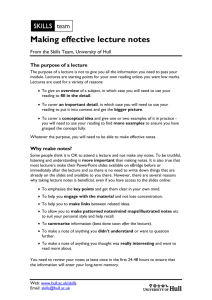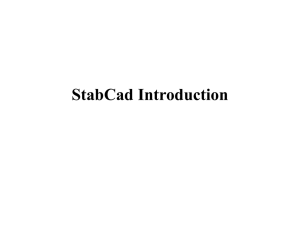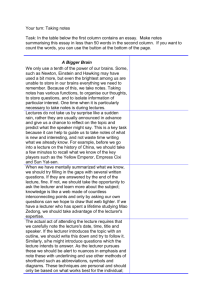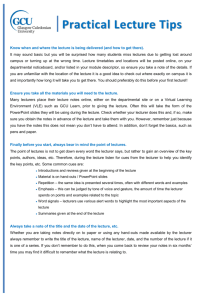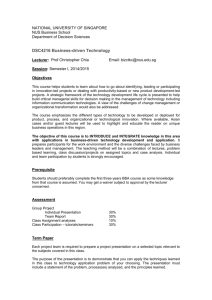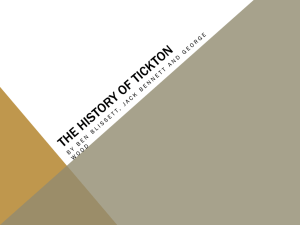note-taking from speech
advertisement
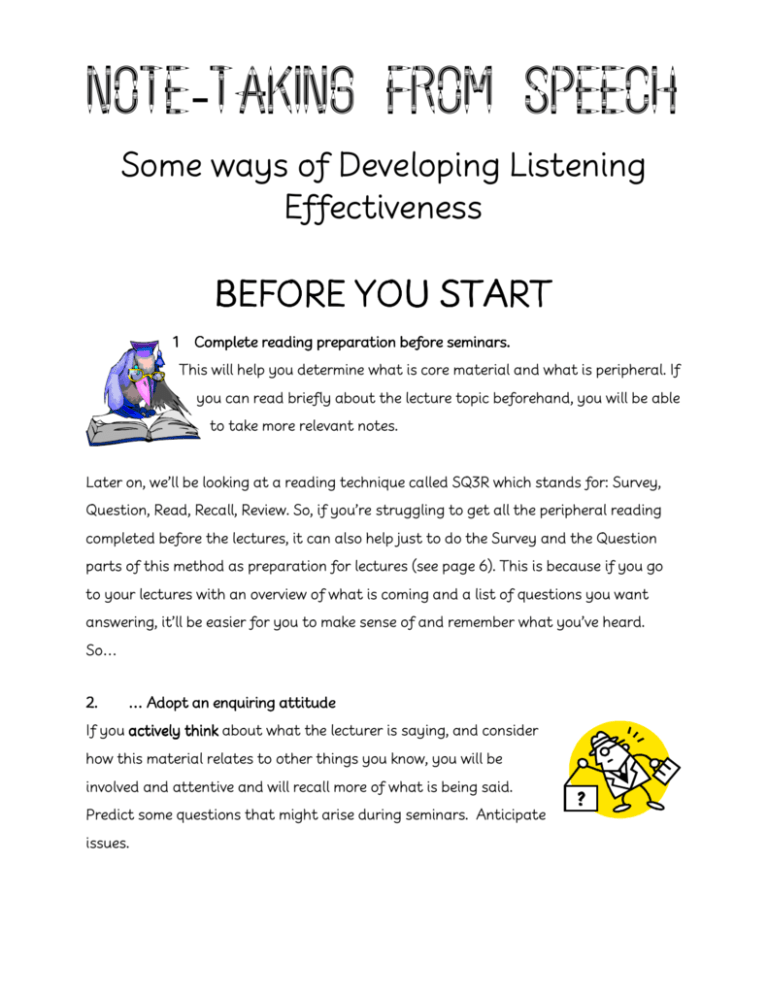
NOTE-TAKING FROM SPEECH Some ways of Developing Listening Effectiveness BEFORE YOU START 1 Complete reading preparation before seminars. This will help you determine what is core material and what is peripheral. If you can read briefly about the lecture topic beforehand, you will be able to take more relevant notes. Later on, we’ll be looking at a reading technique called SQ3R which stands for: Survey, Question, Read, Recall, Review. So, if you’re struggling to get all the peripheral reading completed before the lectures, it can also help just to do the Survey and the Question parts of this method as preparation for lectures (see page 6). This is because if you go to your lectures with an overview of what is coming and a list of questions you want answering, it’ll be easier for you to make sense of and remember what you’ve heard. So… 2. … Adopt an enquiring attitude If you actively think about what the lecturer is saying, and consider how this material relates to other things you know, you will be involved and attentive and will recall more of what is being said. Predict some questions that might arise during seminars. Anticipate issues. 3. Use Action Columns Some students divide their page with a larger than usual margin, say 6 cm, in which they mark significant items. Use arrows in the action column to connect points through the lecture. If your lecturer is presenting you with arguments and ideas on a topic, your action column notes may include headings like: The lecturer's thesis These personal comments beside the notes will help you later. Supporting and conflicting evidence Add any personal comment such as a note to check something you do not understand or to indicate some information you could use in an Sources and references cited assignment. Questions raised in the lecture. 4. Vary your method according to the purpose and type of lecture Take the amount of notes which serves your purpose. BUT, if you are uncertain it is probably safer to take more detailed notes than you may need. As long as taking notes is an active, thoughtful exercise (rather than a passive, mindless chore), you can hardly be wrong. If you'll need the information for exams and it will be difficult to find in such an orderly fashion elsewhere, you will need to take fairly full notes. General po int However, if the material is available fairly readily, you may be better off actively listening, only making notes of the main points or difficult parts of the topic. If the material is being provided for background interest and is not for an assignment or an exam, you may only need to take very spare notes and should listen as actively as you can. 2 Produced by The University of Hull DURING THE LECTURE Listen for oral clues as to what is coming next. Prepare, in advance, to receive that information. When you hear :’There are X reasons why’, something, or ‘there are X causes that explain why’, then get ready to make a list. When you hear: ‘There are several important differences (or similarities) between A and B,’ listen for comparisons or contrasts. Use Abbreviations: These speed up note-taking. Remember: be consistent and keep them simple. Q. What do you use? What can you suggest suggest as useful abbreviations? Some examples of abbreviations in notes: e.g. For example wd Would N. B. Note well c.f. Compare = Equals viz Namely ≠ Does not equal > Greater than/increasingly < Less so & And i.e. That is ∴ Therefore c’d Could ∵ Because Leads to ∀ For all § Section ∃ There exists R Real Ωm Equilibrium ⊥ Normal ⇒ Implies ∑ Sum of argum Argument ± no. esp equatn Plus or minus Number Especially Equation . . . 3 Produced by The University of Hull NOTES FROM LECTURES: SOME GENERAL TIPS. • Head page with topic, subject, lecturer and date. Number and date sequential pages for each lecture. • Allow a wide margin, and space between sections for writing comments later. • Use one side of the paper only. • Work out the lecturer's format. How does the lecture begin? Is there a blackboard plan? Are there diagrams to copy? Does she reiterate points? Does he summarise at the end? This helps you to structure your notes. • Use abbreviations whenever possible. Be consistent to avoid confusion. • Write by phrases rather than whole sentences. Do not quote at length - you will lose the next points. • Spend time at the end on detailed diagrams and graphs, rather than miss noting important issues during the lecture. • Revise your notes and underline or highlight key points as soon as possible. This is very important because it helps to reinforce the information you have gathered in the lecture. After the lecture – do something with the notes as soon as possible. Spend 10 mins doing a shorter, neater set of pattern notes. A day later spend 2 mins recalling, draw a pattern from memory and fill in the gaps. Do this again a week and then a month later. This process of active revision systematically transfers information from your short term memory to your long term memory. You can also compare your notes with someone else’s – fill in any gaps. 4 Produced by The University of Hull NOTE-TAKING FROM TEXT Before you start • Think about being selective in making notes. • Analyse your assignment topic before making notes. • Think about your purpose for making notes and the information you specifically need to record. You are rarely asked to write down all you can think of about a topic. Usually you are required to show that you can interpret and use information to answer a specific question. • You will save a lot of time if your approach to the question is well-directed from the start. To that end there is a reading technique that will help. It is called SQ3R, short for: Survey, Question, Read, Recall, Review. Read Question Recall Survey Review Reading Skills 5 Produced by The University of Hull Survey • contents • index • date • book format • how large is the section that I'm going to read? • pictures • graphs • highlighted text • first (or last) line of each paragraph • why am I reading this? • will it give me the information that I need in order to do this assignment? Question h • what do I want to know? • is this relevant? • what is the main idea of this piece? • what evidence ? • what proof? When you’re ready to start reading – then highlight / underline / ‘mark up’ the text (e.g. use brackets, arrows, etc.). h Based on your list of questions and reading the first (or last) line of each paragraph, it should start to become easier to spot which paragraphs are relevant – with a pencil – scratch out the ones that aren’t. r Problems of highlighting: highlighting Notes have to be taken for a purpose. If you highlight you might obscure what is relevant to your specific purpose. Do you note the key points of an article or just the points that are relevant to your assignment? 6 Produced by The University of Hull DON'T MAKE NOTES FIRST READ AFTER CHOOSING WHICH BITS TO READ MARK THE BEGINNING AND THE END OF THE SECTION Read a. IDENTIFY TOPIC b. ASK FOR PROOF c. FIND THE ANSWER end RE-READ this time you can take notes (if you want) beginning • Close the book • Jot down summary points - Preferably in a mindmap mindmap • Write down: - key words - its message - the answer to your questions Recall • Identify any relationships between any facts and ideas • If you still have any unanswered questions or problems write them down so that you can plan your next study study session SOME TIME LATER (e.g. 2 days later) Go through your notes - are they useable? If they are useable then they’re ready for your assignment If the notes don't make much sense repeat survey stage Until you can make your notes usable while keeping in mind questions like: Is this the appropriate text for my current needs, both in terms of information and way of conveying that Review information? If not, where else can I look / who else can explain this to me? 7 Produced by The University of Hull GENERAL TIPS. Here are some practical suggestions on noting from texts: • Avoid the temptation to take too many, or too detailed notes. • Beware highlighting as it may not pick out the key features that are relevant to your assignment, but may pick them all out. • Only pick out the key, key relevant points, points depending on your purpose. Always ask yourself “How does this information relate to the topic I'm researching?” Be prepared to stop noting and move on if the information is not relevant. • Choose either index cards or A4 paper. Use one side only. • Record full bibliographical details for later use. • Leave a margin and good spacing for later comments and highlighting. • Use Sub-Headings. Invent a short title for each new note you make. This aids tracking down and assembling information later. • Some students colour-code their notes to show different topic areas. • Note chapter and page as you progress through a text. • Whenever possible, use your own wording in your notes to reach an understanding of the reading. • If you need to use an exact, short quotation, copy it down accurately. Distinguish a direct quotation by using inverted commas or writing it in another colour pen. Its source will need to be properly acknowledged in your work. • Label any photocopied material clearly with topic, date and bibliographic details as applicable. Store with your other notes. • Organise and file your notes under subject and topic headings. This can be done alphabetically with a filing system, with clearly marked or coloured folders, or in any way that works well for you. 8 Produced by The University of Hull
